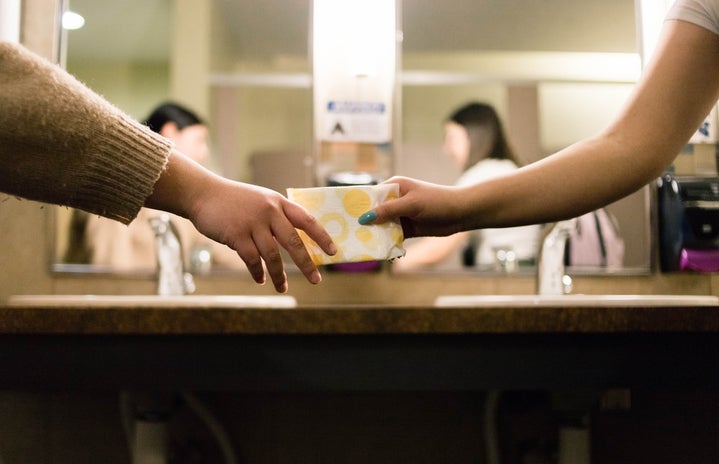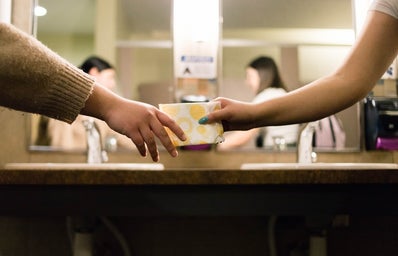In this interview, I talk with fellow WCU student Megan Harth, who’s in charge of the Period Project here on campus. We discuss the Period Project, its inner workings, and the broader impact that such an organization has on justice for menstruating people worldwide.
What is the Period Project and what does it do?
The Period Project helps to supply free and assessable menstrual products on West Chester University’s campus. Menstrual products, as we know, are very expensive. Toilet paper is free in public restrooms, so why aren’t period products?
I was amazed that this was not already around when I started school here. I feel that it should be available everywhere in the world, but since it’s not, we’re taking it one step at a time, starting at this university.
Tell me about yourself and what you do for the Period Project.
Hi! My name is Megan Harth. I’m a Junior with a major in Psychology and a minor in Women’s and Gender Studies. The Period Project was started by Katie Kerr, who graduated last May. I overheard her talking about it in conversation and asked if she ran a Period Project on campus. She told me that she did and that she was actually looking for people to take over it for next semester and it just blossomed from there.
I was a part of a feminist club in high school that started my sophomore year. We supplied free menstrual products to every bathroom in my high school, so I was already aware of the logistics of having free menstrual products in a public place and the barriers that come with that. I was frustrated in the beginning because I had no idea where to start, being only one person. I was working with Dr. Stevenson at first, and I had a hard time figuring out where to get free supplies. I needed help, but I didn’t know who to ask. Then, miraculously one day, I got an email from the resource pantry saying, “Hey, Megan, we reached out to Katie Kerr (she used to work at the resource pantry) and we have a student who works here who wants to help you out with the Period Project to get it back up and running.” They gave me his contact, and at first, I wondered why a guy wanted to help with the Period Project? So I reached out and asked to meet up. We instantly clicked, his name is Joey Harkins, and he now happens to be one of my best friends. He works at the resource pantry and is a supply chain major, so he helps out with the business side of things, as well as sending emails, and he keeps the data of how many menstrual products we’re giving out each week, how many are being taken, and tracking the statistics of how much is being used. Joey and I have been working nonstop since we met in September. We also have menstrual products in shoe boxes in every building on campus besides the dorms.
What effects does a lack of access to menstrual products have on people? Why is this a serious issue?
Some people have to decide between buying groceries and buying menstrual products, and they should not have to. Menstrual products are a necessity and should be accessible to everyone. Around 1 in 4, people have to miss class because of their period. If they get their period in the middle of class, they have to go all the way back to their dorms to take care of it. Also, we have a big population of commuters on campus as well. Education is extremely important, so having menstrual products available in every building prevents people from missing out on class time. Even outside of a university setting, it’s a financial burden to buy menstrual products every month. Having free access to them as college students can be life-saving because, as everyone knows, we are pretty broke! I’d rather spend my money on groceries so I can eat and stay alive than worry about when I’ll get my period and how I’ll take care of it.
Can you recall when you first became aware of this issue, and how did this awareness affect you?
I became aware when I first got my period because I did not know what it was until I got it. After that, I put two and two together and realized that those dispensers in public bathrooms were for period products. Then I started wondering why we have to pay for tampons and pads when we are in the bathroom. That made me so angry, and it sparked a flame in little twelve-year-old me. I felt voiceless at the time, but when I started high school, I became close with a group of seniors who wanted to start a club where people could feel comfortable talking about these issues with each other and making a difference on our high school campus. That is how our feminist club, In Her Element, was born. Our school bathrooms had these old dispensers that you had to put a quarter into, and we thought, ‘we need to get rid of this! — So we did. We got dispensers that supply tampons and pads for free. So I think I have always cared about period poverty and accessibility, but in general, people need to be aware of the human body, and we need to talk about it. Talking about periods should not be such a taboo conversation. Menstruators should not have to feel like they need to hide their tampons when they walk to the bathroom during class or be afraid to ask the person next to them for a menstrual product. It is important to start that conversation.
What challenges have you run into with your work for the Period Project?
Joey and I want to have menstrual products available in every bathroom at WCU, regardless of gender-orientated restrooms. They are already in the gender-neutral bathrooms, but we have had some standoffish responses to putting them in the male ones. We’re still pushing for that right now. The population of male menstruators is low, but they get overlooked so easily. People think of periods as a ‘womanly’ thing, but women are not the only ones who menstruate. We need to make menstrual products accessible to them as well. That has been a challenge because some people can not accept or understand that men can menstruate.
Funding is also a big challenge. We need continuous funding for a project like this. It’s so widely needed, and we have the data to back it up. It’s not as much a money issue as trying to get respect for the Period Project.
Do you believe that enough is being done to combat period-related issues in the world today?
No. I think it starts with having conversations. Women of all ages are so hesitant to talk about periods with one another. Such a large portion of the world has periods, but talking about it is seen as taboo. Because of that, people have a hard time speaking out when they’re in need of menstrual products. Most of the higher-ups in companies, governments, and universities don’t menstruate, and they just don’t have empathy toward menstruators. It’s like if not a problem for them, it’s not a problem for other people.
What more can people do to combat this issue?
If you have disposable income, donate money. You can also buy period products and donate them to the resource pantry on campus or resource pantries at various other universities, homeless shelters, domestic violence shelters, and charities. Signing petitions, and calling state representatives, are all good ways to keep this issue alive.
How does the Period Project contribute to gender equality and the rights of AFAB individuals?
We educate people on the facts about menstruation. Things like terminology – for example, the term ‘feminine hygiene products’. 1. It’s not just ‘feminine’ people who menstruate, and 2. It’s not about hygiene. Periods are natural, and they are not unhygienic. We also provide accessibility to menstrual products to everyone, regardless of gender.
We know that there’s a stigma around periods, everything from making menstrual products accessible to talking about them. What do you think can be done to combat that stigma?
Tampon and pad commercials used to use blue liquid to show absorbency. They started using red liquid about five years ago to indicate that it’s blood. I think people seeing commercials like that really helped. It’s also important to talk about it, as I mentioned previously. In classrooms, when someone gets their period and has to excuse themselves to the bathroom, they shouldn’t have to hide the menstrual products they take with them. I remember hiding tampons in my sleeves in middle school to avoid someone catching me carrying a tampon to the restroom. People should also be allowed to take time off from work if they’re on their periods. Some people have conditions like endometriosis, which causes extremely painful menstruation, to the point where they feel physically sick from it. There should be more respect towards situations like that, and people shouldn’t have to make up excuses for the pain they are experiencing.
Are you involved in any other feminist or activist organizations on campus?
Yes! I am a part of Phi Sigma Sigma and I am on the Panhellenic executive council on campus. Sororities are all-female, so it’s a gendered community, but I believe that there is power in that. I know there are other organizations on campus that I am not part of that are amazing activist-orientated spaces – the trans and queer advocacy center, the center for women and gender equity, and the dowdy multicultural center are all places that help to address/educate on various political issues and advocates for a campus community that values the safety, equality, and intellectual advancement of historically marginalized groups.
How do you feel about the state of education about periods and AFAB bodies?
It’s not good. There definitely needs to be more education on this topic. Sometimes I feel like I have learned more about my own body from doctors on TikTok than I have in school. I have friends who have never even heard of menstrual cups! Some people don’t know about the basic biology of a menstruating body, including those who menstruate.
What other related issues do you believe people should pay attention to?
Access to bathrooms goes hand-in-hand with period poverty/accessibility issues. A lot of the gender-neutral restrooms on campus are locked or hard to find, which makes access to them harder. Along with that, a person who identifies as a man should be permitted to use the men’s restroom, and a person who identifies as a woman should be permitted to use the women’s restroom. I personally dislike gendered bathrooms and believe all bathrooms should be gender-neutral.
How can students at West Chester get involved with the Period Project?
Since we don’t have continuous funding right now, it would help other clubs and organizations to do menstrual product drives and philanthropic events to benefit the period project. Raising awareness is very important, and if you have the ability to donate funds or menstrual products, that’s extremely helpful and makes a huge difference.
If you are interested in being involved in the period project please contact Megan directly harthmegan@gmail.com


